-
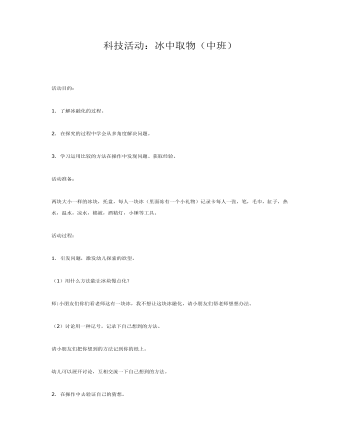
中班科学冰中取物课件教案
2. 在探究的过程中学会从多角度解决问题。3. 学习运用比较的方法在操作中发现问题、获取经验。活动准备:两块大小一样的冰块,托盘,每人一块冰(里面冻有一个小礼物)记录卡每人一张,笔,毛巾,缸子,热水,温水,凉水,棉被,酒精灯,小锤等工具。活动过程:1. 引发问题,激发幼儿探索的欲望。(1)用什么方法能让冰块慢点化?师:小朋友们你们看老师这有一块冰,我不想让这块冰融化,请小朋友们帮老师想想办法。
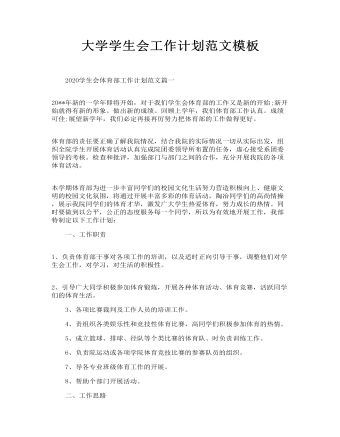
大学学生会工作计划范文模板
一、工作职责 1、负责体育部干事对各项工作的培训,以及适时正向引导干事,调整他们对学生会工作,对学习,对生活的积极性。 2、引导广大同学积极参加体育锻炼,开展各种体育活动、体育竞赛,活跃同学们的体育生活。 3、各项比赛裁判及工作人员的培训工作。
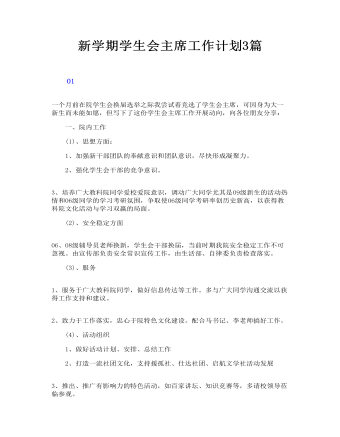
新学期学生会主席工作计划3篇
(1)、思想方面: 1、加强新干部团队的奉献意识和团队意识,尽快形成凝聚力。 2、强化学生会干部的竞争意识。 3、培养广大教科院同学爱校爱院意识,调动广大同学尤其是09级新生的活动热情和06级同学的学习考研氛围,争取使06级同学考研率创历史新高,以获得教科院文化活动与学习双赢的局面。
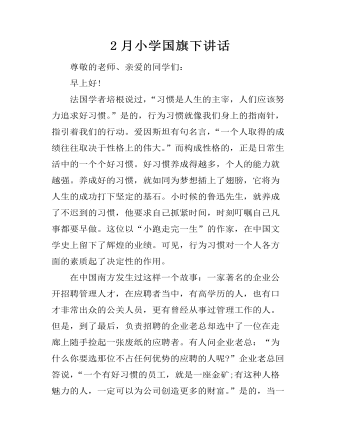
2月小学国旗下讲话
尊敬的老师、亲爱的同学们:早上好!法国学者培根说过,“习惯是人生的主宰,人们应该努力追求好习惯。”是的,行为习惯就像我们身上的指南针,指引着我们的行动。爱因斯坦有句名言,“一个人取得的成绩往往取决于性格上的伟大。”而构成性格的,正是日常生活中的一个个好习惯。好习惯养成得越多,个人的能力就越强。养成好的习惯,就如同为梦想插上了翅膀,它将为人生的成功打下坚定的基石。小时候的鲁迅先生,就养成了不迟到的习惯,他要求自己抓紧时间,时刻叮嘱自己凡事都要早做。这位以“小跑走完一生”的作家,在中国文学史上留下了辉煌的业绩。可见,行为习惯对一个人各方面的素质起了决定性的作用。在中国南方发生过这样一个故事:一家著名的企业公开招聘管理人才,在应聘者当中,有高学历的人,也有口才非常出众的公关人员,更有曾经从事过管理工作的人。但是,到了最后,负责招聘的企业老总却选中了一位在走廊上随手捡起一张废纸的应聘者。有人问企业老总:“为什么你要选那位不占任何优势的应聘的人呢?”企业老总回答说,“一个有好习惯的员工,就是一座金矿;有这种人格魅力的人,一定可以为公司创造更多的财富。”是的,当一个人养成了良好的习惯,他的人格魅力便会自然得到提升。
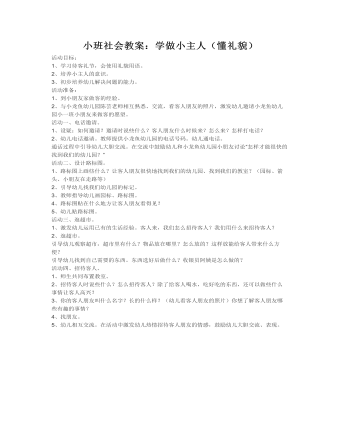
小班社会教案:学做小主人(懂礼貌)
2、培养小主人的意识。 3、初步培养幼儿解决问题的能力。 活动准备: 1、到小朋友家做客的经验。 2、与小龙鱼幼儿园陈芸老师相互熟悉、交流,看客人朋友的照片,激发幼儿邀请小龙鱼幼儿园小一班小朋友来做客的愿望。 活动一、电话邀请。 1、设疑:如何邀请?邀请时说些什么?客人朋友什么时候来?怎么来?怎样打电话? 2、幼儿电话邀请。教师提供小龙鱼幼儿园的电话号码。幼儿通电话。 通话过程中引导幼儿大胆交流。在交流中鼓励幼儿和小龙鱼幼儿园小朋友讨论“怎样才能很快的找到我们的幼儿园?”
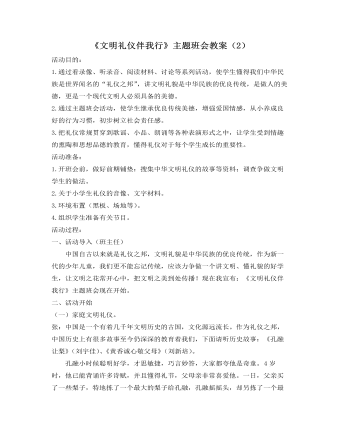
《文明礼仪伴我行》主题班会教案(2)
(二)校园文明礼仪张:中国是一个有着几千年文明历史的古国,文化源远流长“礼学”是中国文化的重要组成部分。在中国,自古以来,讲究做人要懂得礼貌谦让,因此中国被称为“文章华国,诗礼传家”,被称为“文明礼仪之邦”。张:中国古代的礼仪规范不断发展改革形成了我们的现代文明礼仪,在校园这个既庄严又活泼、既紧张又文明的环境中,我们少先队员不仅要学好文化知识,还要自觉加强道德修养,讲礼貌,懂礼仪,做一个文明少年。礼仪举止包含了许多内容,你知道那些校园礼仪吗?谁愿意说给大家听?学生自由发言。尹:规范的校园礼仪是怎样的呢?下面请欣赏(岳炀)表演的几种最基本的礼仪形式。表演校园礼仪:正确的走姿、正确的站姿、正确的坐姿、交往礼仪、课堂礼仪、课间礼仪、递物与接物。
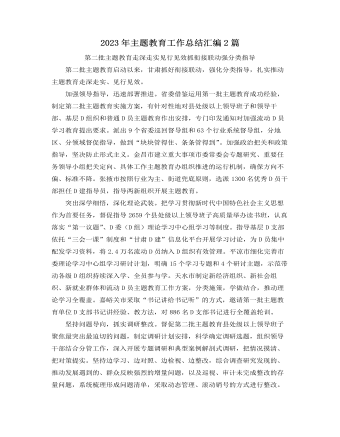
2023年主题教育工作总结汇编(2篇)
把学习贯彻有关主题教育系列重要讲话,与学习贯彻对福建、对民政工作的重要讲话重要指示批示精神结合起来,与学习贯彻D的二十大精神结合起来,做到一体学习、一体领会、一体贯彻。四是丰富形式“乐学”。制定局机关青年理论学习计划,开展“青年大学习”行动,结合“中秋、国庆”两节举办“感悟思想伟力、书写青春华章”青年读书分享会,开展形式多样的“三会一课”、主题D日活动,通过寓教于乐,增强学习吸引力和感染力。五是警示教育“促学”。结合全市民政系统突出问题专项治理,开展警示教育,组织全系统D员干部职工开展旁听巡听、观看警示教育片,召开警示教育大会,以案释纪、以案释法,用身边事教育人,坚定不移推进全面从严治D向纵深发展,持续营造风清气正的良好政治生态,扎实推进主题教育走深走实。六是现场交流“活学”。组织D员干部到闽西革命历史博物馆开展现场教学,深入了解革命时期闽西人民在中国共产D领导下所进行的可歌可泣的革命斗争历史,更加深切地感受、朱德等老一辈无产阶级革命家对中国革命事业作出的重大贡献,达到学思想、强D性、重实践、建新功的效果。
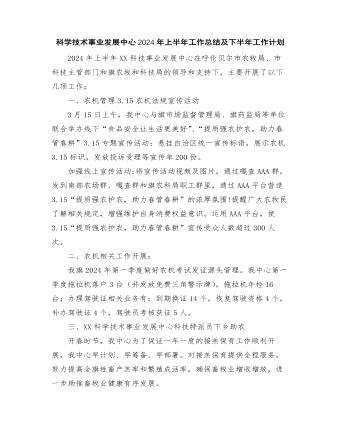
科学技术事业发展中心2024年上半年工作总结及下半年工作计划
六、“保护呼伦湖助力美丽呼伦贝尔市”生态文明践行活动为持续做好呼伦湖流域的生态环境保护治理工作。XX组织开展“保护呼伦湖助力美丽呼伦贝尔”生态文明实践行动。此次全旗共有600余名干部职工统一行动,对呼伦湖流域XX境内生产生活垃圾、建筑垃圾及废弃网围栏进行了集中清理,清扫垃圾500余袋,使呼伦湖及周边地区环境得到了明显改善。2024年下半年工作计划1、为农机安全生产打基础,举办农机驾驶员培训班。2、以人为本推进科技兴牧,组织农牧民参加高素质牧民培训班。3、增强基层科技技术力量,组织基层农技人员下乡开展教育培训。4、加强科技知识宣传、培训,发挥好科技特派员服务农牧民作用。5、认真落实农机构置补贴项目资金,规范操作严格管理。6、严格农机牌、证、照管理,杜绝无证驾驶,确保农机安全生产。7、完成上级交办的其他工作。
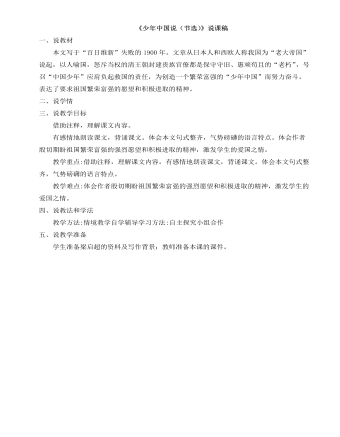
部编人教版五年级上册《少年中国说(节选)》说课稿
一、说教材本文写于“百日维新”失败的1900年。文章从日本人和西欧人称我国为“老大帝国”说起,以人喻国,怒斥当权的清王朝封建贵族官僚都是保守守旧、愚顽苟且的“老朽”,号召“中国少年”应肩负起救国的责任,为创造一个繁荣富强的“少年中国”而努力奋斗。表达了要求祖国繁荣富强的愿望和积极进取的精神。二、说学情三、说教学目标

人教版新目标初中英语七年级下册Where is the post office教案2篇
Period 2 (3a----Section B 2c)Preview(Pre-task): Key points: What laAdd another information about their pen pals----their language on the cardnguage does she/he speak?She/He speaks....Does she/he have any brothers and sisters? Does she/he speak English?Preview(Pre-task): Add another information about their pen pals----their language on the cardKey points: What language does she/he speak?She/He speaks....Does she/he have any brothers and sisters? Does she/he speak English?Step 1 Revision1.Revisionand dictation of the new words 2.Revise the drills they learned yesterday.(by pairwork and grammar exercise)Step 2 Leading-inT has a conversation with one student. The conversation is following:---Do you have a pen pal?---Yes, I do.---What's your pen pal's name? ---His/Her name is....---Where is your pen pal from? ---He/She is from...---Where does he/she live? ---He/She lives in....---What language does he/she speak?He/She speaks...Write the new words on the Bb. They are following: EnglishChineseJapaneseFrenchStep 3 LearnLearn the new words with the whole class.Finish 3a with the students3b Pairwork T still does an example with one student Then the Ss practise in pairs. The example is following:--Curry Muray is my pen pal. He is from the United States.---What language does he speak?
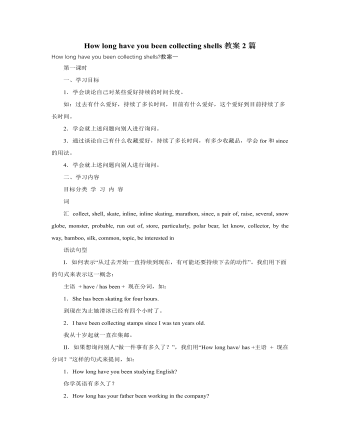
人教版新目标初中英语八年级下册How long have you been collecting shells教案2篇
Step Ⅱ Show the new words on the screen and teach the new words. Read the new words to students and ask them to repeat.Step Ⅲ 3aThis activity introduces new vocabulary and provides reading practice using the target language.In this activity first look at the four pictures.T: What can you see in the pictures?Ss: Four snow globes.T: Right. There are four snow globes in the pictures. And what are they?Ss: They are a monster, two polar bears, two penguins and a birthday cake.Write these words on the blackboard: snow globe; monster; polar bear; penguin and birthday cake. Read them to the class and ask students to repeat each one. Make sure students understand each word.Use a computer to show the E-mail message on the screen and read the message to students.Get students to read the e-mail on their own, and then draw lines connecting each snow globe and its description.Correct the answers.AnswersA line should connect each snow globe picture with the words that describe it in the letter.Step Ⅳ 3bThis activity provides writing practice using the target language.First review Activity 2a on Page 47.Then ask students to complete the message according to Activity 2a.Some partial sentences are given to students. Write about one person's collection.When students work, walk around the room checking the progress and offering help as needed.When they finish, ask some students to read their messages to the class.

人教版新目标初中英语七年级下册How was your weekend教案2篇
Teaching Goal:1. General aims:Talk about recent past events2. Particular aims:A. Language Focus.Talk about recent past events and think of the past events.B. Language goalsHow was….?It was …What did …do over the weekend?C. Language structures:(1). How was your weekend? I was great. Pay attention to no form.(2). What did you do over the weekend? I played soccer. We went to the beach.D. Useful words and phrases:Words: was, did, went, beach, over, project, test, wasn’t, false, number, geography, spend, week, most, mixture, their, had, little, cook, read, saw, change, everyone, sit, sat, no, anythingPhrases: did one’s homework, played soccer, cleaned my room, went to the beach, played tennis, went to the movies, on Saturday morning, over the weekend, cook … for, what about, do some reading, have a party, talk show, go shoppingE. Grammar language:Present simple past tenseRegular and irregular verbsF. Learning strategies:Tour and holidaysG. Interdiscipinary:H. Emotion and manner:Teaching time: 5 periodsTeaching procedures:Period One教学步骤、时间 教师活动 学生活动 媒体应用Step 1Free talk 3’ Ask some questions like:Who’s on duty today?What’s the weather like? Answer and talk about something.让同学们回答下列问题1. Do you like weekend? (Let some students answer)It takes them three minutes to talk about the question.2. Why do you like weekend? (let the students answer) Most of the students like the weekend此时教师用汉语问:“在周末期间问你干了什么?这句话用英语这么回答?Let the students guess.At last the teacher give them right answer3. What did you do over the weekend?(板书、学习)
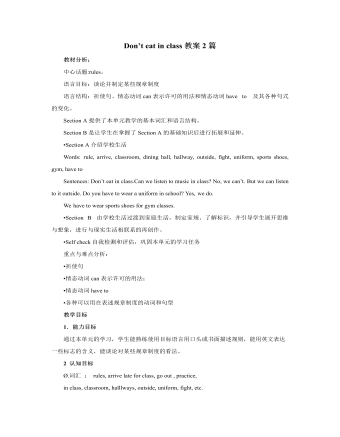
人教版新目标初中英语七年级下册Don’t eat in class教案2篇
Don’t fight. =You can’t fight. (板书,教读)教师把这些句子板书在黑板上,并请学生大声整齐地读祈使句和“can’t”句型,并让学生注意两种句型表达形式的不同和转换,“Don’t …=You can’t…”;并对学生说:These are our school rules. (板书,教读) You can’t break the school rules. Don’t break the school rules.(板书,教读)步骤3 :Practicea. T: Now, each of the students is breaking one of these rules.Please finish 1a.学生看图,完成1a的内容,检查答案并大声朗读校规。b. 听录音,完成1b,选出四位学生都违反了哪条校规;听之前,学生要读会英文名。c. 请两位学生朗读1c部分的句型;要求学生两人一组对话表演,SA扮演外校转来新生,SB告知本校校规。(学生可经过讨论,多说出他们想到的校规,不必只限于书上;教师应给予帮助)2) 第二课时(2a~4)步骤1 :warming up of revisionT: What are the rules at your school?学生使用“can”或祈使句表达各条校规;其中老师可引出“eat in the cafeteria outside”的表达。步骤2 :Practicea.T: Christina is an exchange student. She doesn’t know the rules. Let’s listen, what activities they’re talking about?学生听第一遍时,完成2a;第二遍时,完成2b;b. 请学生领读2c部分,看着2a完成的表格,理解2c活动的要求;分成小组针对2a进行问答;
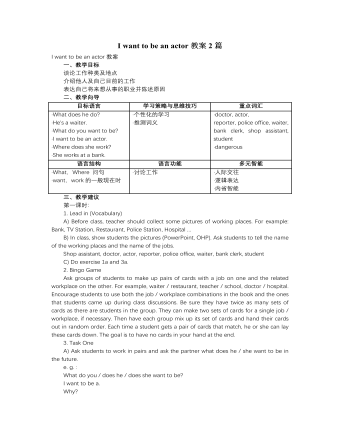
人教版新目标初中英语七年级下册I want to be an actor教案2篇
三、教学建议第一课时:1. Lead in (Vocabulary)A) Before class, teacher should collect some pictures of working places. For example: Bank, TV Station, Restaurant, Police Station, Hospital ...B) In class, show students the pictures (PowerPoint, OHP). Ask students to tell the name of the working places and the name of the jobs.Shop assistant, doctor, actor, reporter, police office, waiter, bank clerk, studentC) Do exercise 1a and 3a.2. Bingo GameAsk groups of students to make up pairs of cards with a job on one and the related workplace on the other. For example, waiter / restaurant, teacher / school, doctor / hospital. Encourage students to use both the job / workplace combinations in the book and the ones that students came up during class discussions. Be sure they have twice as many sets of cards as there are students in the group. They can make two sets of cards for a single job / workplace, if necessary. Then have each group mix up its set of cards and hand their cards out in random order. Each time a student gets a pair of cards that match, he or she can lay these cards down. The goal is to have no cards in your hand at the end.3. Task OneA) Ask students to work in pairs and ask the partner what does he / she want to be in the future.e. g. :What do you / does he / does she want to be?I want to be a.Why?Because it's (adj).B) Vocabulary: Section B, 1a4. Homework 1.2.
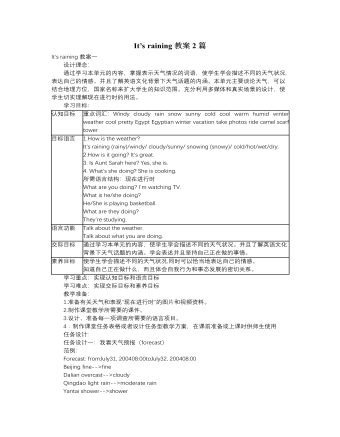
人教版新目标初中英语七年级下册It’s raining教案2篇
1 Each group choose one place to describe and what you are doing in it Choose one place, and describe what they are doing 2 Move around the room and give suggestions Talk about it and write it down 3 Ask one to show their works and act it Choose one of each group to make a report 4 Evaluate the best group and the best reporter Choose the best one Homework Ask your friends their ideal place and write about it教学反思:新课程标准中强调学生在课堂中的主体地位,在综合课中他们的主体地位就更加突出。在各个活动中给不同程度的学生不同层次的任务,让各层面的学生都有表现发挥的机会,从而产生对英语的兴趣。使用照片图片多媒体来辅助教学,效果更好。同时让了解其他国家风景,风俗的同学介绍ideal place,增加学生的背景知知识,实现跨学科交流的目的。教案点评:采用任务型教学模式,在各个活动中给不同程度的学生不同层次的任务,让各层面的学生都有表现发挥的机会,从而产生对英语的兴趣。使用照片图片多媒体来辅助教学,效果更好。让了解其他国家风景,风俗的同学介绍ideal place,增加学生的背景知识,实现跨学科交流的目的。
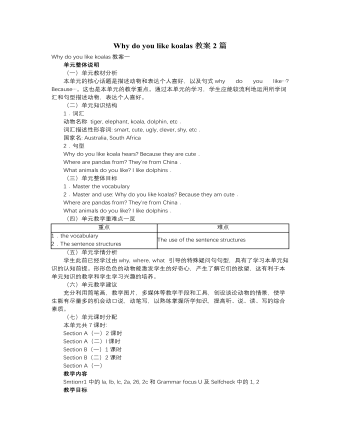
人教版新目标初中英语七年级下册Why do you like koalas教案2篇
单元整体说明(一)单元教材分析本单元的核心话题是描述动物和表达个人喜好,以及句式why do you like…? Because…。这也是本单元的教学重点。通过本单元的学习,学生应能较流利地运用所学词汇和句型描述动物,表达个人喜好。(二)单元知识结构1.词汇动物名称 tiger, elephant, koala, dolphin, etc.词汇描述性形容词: smart, cute, ugly, clever, shy, etc.国家名: Australia, South Africa2.句型Why do you like koala hears? Because they are cute.Where are pandas from? They're from China.What animals do you like? I like dolphins.(三)单元整体目标1.Master the vocabulary2.Master and use: Why do you like koalas? Because they am cute.Where are pandas from? They're from China.What animals do you like? I like dolphins.(四)单元教学重难点一览(五)单元学情分析学生此前已经学过由why, where, what 引导的特殊疑问句句型,具有了学习本单元知识的认知前提。形形色色的动物能激发学生的好奇心,产生了解它们的欲望,这有利于本单元知识的教学和学生学习兴趣的培养。
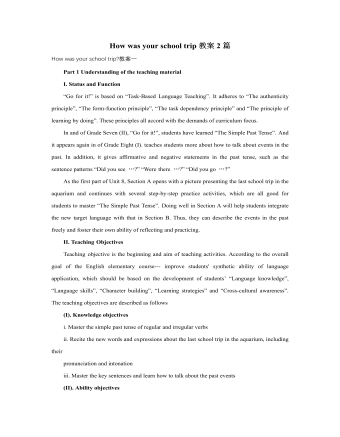
人教版新目标初中英语八年级上册How was your school trip教案2篇
“Go for it!” is based on “Task-Based Language Teaching”. It adheres to “The authenticity principle”, “The form-function principle”, “The task dependency principle” and “The principle of learning by doing”. These principles all accord with the demands of curriculum focus.In and of Grade Seven (II), “Go for it!”, students have learned “The Simple Past Tense”. And it appears again in of Grade Eight (I). teaches students more about how to talk about events in the past. In addition, it gives affirmative and negative statements in the past tense, such as the sentence patterns “Did you see …?” “Were there …?” “Did you go …?” As the first part of Unit 8, Section A opens with a picture presenting the last school trip in the aquarium and continues with several step-by-step practice activities, which are all good for students to master “The Simple Past Tense”. Doing well in Section A will help students integrate the new target language with that in Section B. Thus, they can describe the events in the past freely and foster their own ability of reflecting and practicing. II. Teaching ObjectivesTeaching objective is the beginning and aim of teaching activities. According to the overall goal of the English elementary course--- improve students' synthetic ability of language application, which should be based on the development of students’ “Language knowledge”, “Language skills”, “Character building”, “Learning strategies” and “Cross-cultural awareness”. The teaching objectives are described as follows(I). Knowledge objectivesi. Master the simple past tense of regular and irregular verbsii. Recite the new words and expressions about the last school trip in the aquarium, including their pronunciation and intonation

人教版新目标初中英语八年级上册How do you get to school教案2篇
Step Ⅶ Role play ( Work on 1b)1. First ask two students to read the dialogue to the class.Sa: How do you get to school?Sb: Well, I ride my bike to the subway station. Then I take the subway.2. Now work with a partner.Suppose you use two kinds of transportation to get to school \Hangzhou\Beijing... (bus, train, subway, walking, bike, etc.) Tell how you get there. You may use the phrases in 1a.3. Then ask different pairs of students to present their conversations to the class.Step ⅧListening1. Work on 2a(1) First ask students to read the list of information that Thomas wants to know.…where Nina lives.…how far from school she lives.…how long it takes to get to school.…how she gets to school.…what she thinks of the transportation.(2) Tell students what transportation and bus stop mean.bus stop 汽车站 transportation n. 运送;运输Then tell students we'll hear a recording. Please put a checkmark in front of each thing that Thomas wants to know.(3) Now play the recording for students.( Have students pay attention to the sample answer.) (4) Then correct the answers.

人教版新目标初中英语八年级上册What are you doing for vacation教案2篇
Teaching goals : 1. Words & phrases: babysit ,get back , fishing , rent , think about , decide(on) , tourist etc. 2. How to talk about future plans . 3. 现在进行时表示将来计划或行动. 4. 特殊疑问句(where , when , how long引导) Important and difficult points : Drills :What are you doing for vacation ? I’m watching TV . When are you going ? I’m going … . How long are you staying ? We’re staying for five days . Teaching aids : cards and a tape ,a large wall calendar . Period 1 Teaching procedures : Step 1Leading in1. Free talk . 2. Put up the wall calendar . T: I’m staying home on Saturday (pointing to next Saturday ).Ss repeat . Ss: I’m staying home on Saturday . T: OK. Today we’ll learn how to talk about future plans. Step 2Pre-task SB Page 13 , 1a . 1. Look at the picture carefully and tell what you see in the picture . 2. Write the activities from the pictures in the box and add some more . 3. Practice reading . Step 3While-task1. Using the activities we write in 1a to make conversations .For example :What are you doing for vacation ? I’m visiting my uncle . 2. Pairwork .Practice in pairs . 3. 用第三人称练习对话.
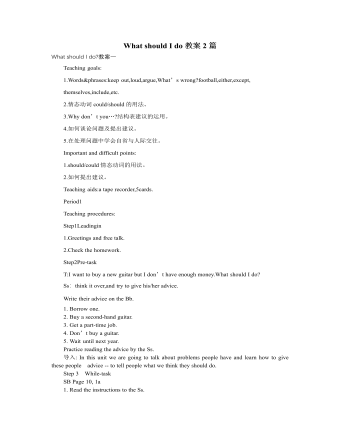
人教版新目标初中英语八年级下册What should I do教案2篇
说明:在帮Li Lei提建议的同时,教育学生如何学好英语。第三课时教学目标1. 语言目标:a) 词汇: Original, in style, haircut, the same as.b) 语言结构:My friend wears the same clothes and has the same haircut as I do.2. 能力目标:大多数学生能够谈论自己喜欢哪种服装,提高查找信息的能力。3. 情感目标:学会如何与朋友相处,要有自己对时尚的看法。教学重点掌握一些重要词汇。教学难点学会谈论问题,并能提出书面建议。◆教学突破首先针对Erin的问题,提出个人的建议,模仿2c部分的对话展开双人交际Pair-work;听老师诵读3a部分的信件,并找出LEFT OUT的问题所在;学生完成3b部分的内容,给Left Out提出书面的建议;学以口头形式提出自己目前存在的某个问题,讲给大家听,让同学们给自己提出一个建议,并作笔录;学生两、三个人分成一组,随意性地进行口语交际,谈论P14的第4部分的某个问题,相互交换意见。



